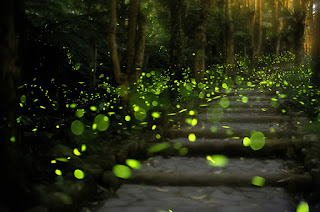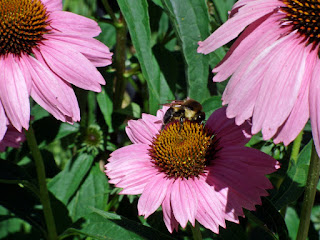 Fireflies are amazing little creatures. These beetles are a welcome pleasure since seeing them is a sign that summer is truly upon us. Unfortunately, they are on the decline. Losing these little fairies of the season is not only sad for the child in all of us, but it is sad for the environment as well. There are, however, a number of things you can do to keep the magic glowing in your yard.
Fireflies are amazing little creatures. These beetles are a welcome pleasure since seeing them is a sign that summer is truly upon us. Unfortunately, they are on the decline. Losing these little fairies of the season is not only sad for the child in all of us, but it is sad for the environment as well. There are, however, a number of things you can do to keep the magic glowing in your yard.1) Turn off the lights. Fireflies signal their mates by flashing their perfect little lights. Ambient light from houses, streetlights, garden lights, etc., make it hard for the guys and gals to see each other. From twilight to just after dark, resist the urge to pop on the lights and you might just have a chance to see the light show of love.
2) Don't over mow, at least not that low. The firefly enjoys hanging out in the grass during the day. And eggs and larvae are born and grow in the ground. They prefer longer grass, so resist the urge to keep the lawn trimmed as tight as a crew cut. At the very least allow for some longer grasses to grow in some areas of your lawn to give the lightening bugs somewhere to live.
3) Let the slugs ... be slugs. Although most adult fireflies eat nectar and pollen, the larvae are carnivores and enjoy snaking on slugs, grubs, snails and even aphids. So the little glow worms (yep, the larvae sometimes glow) are actually natural pesticides for the garden.
4) Speaking of pests, Avoid pesticides and fertilizers. Commercial pesticides don't discriminate and affect a broad range of insects - including the good ones like fireflies. Chemical fertilizers can also cause issue since some of the constituents are the same as the pesticides. Try to use natural fertilizers like compost, and look for natural remedies like companion planting to deter bad bugs.
5) Leave the natural litter. Well, not litter. But the fallen leaves and wood piles kind of litter. Larvae love rotting woods and leaves, like the kind found on the forest floor. Having some of these around will give them a cozy home to grow in.
 6) Plant what they like. Your yard will look great too! Native trees and pines are good homes to local fireflies, they love the shade and protection. Fireflies tend to like moist areas, especially wet meadows, forest edges, farm fields, and wild bog, marsh, stream and lake edges. Adult fireflies eat nectar and pollen, so plant natives would be extremely enticing to our flashing friends.
6) Plant what they like. Your yard will look great too! Native trees and pines are good homes to local fireflies, they love the shade and protection. Fireflies tend to like moist areas, especially wet meadows, forest edges, farm fields, and wild bog, marsh, stream and lake edges. Adult fireflies eat nectar and pollen, so plant natives would be extremely enticing to our flashing friends.7) Don't put them in a jar. At least not for a long time. A short time for better observation would be OK, but a longer time might kill them. With their numbers dwindling it's best to spot them while they flit about. In fact if you like an evening firefly watch, you can join the Museum of Science Firefly Watch. Help keep track of the firefly population and maybe help save them!
Fireflies bring out the magic of a fresh new summer. Help keep that magic going by taking care to encourage the fairies to light up the night.

No comments:
Post a Comment